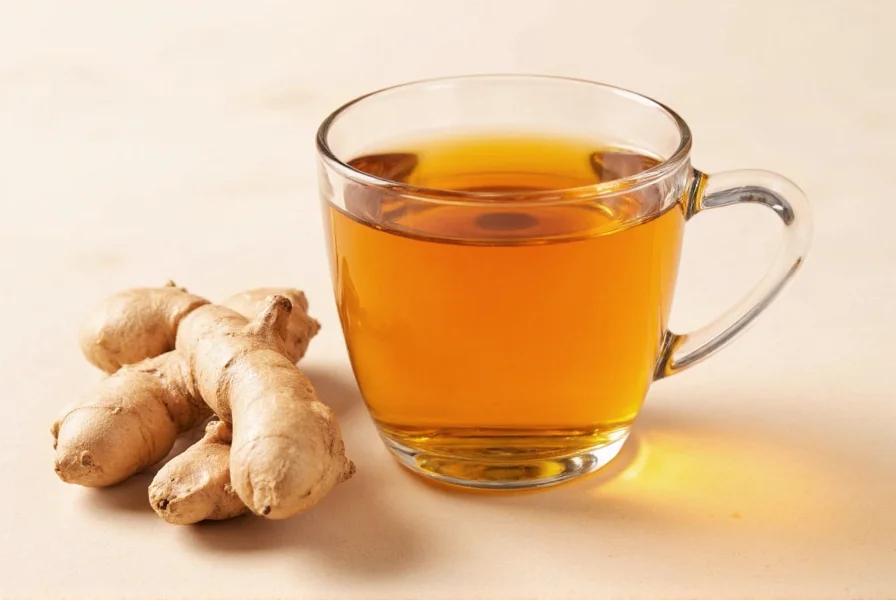Ginger tea has been cherished for centuries across various cultures for its remarkable health properties. This simple beverage, made from the rhizome of the Zingiber officinale plant, offers a wealth of benefits when consumed at strategic times throughout your day. Understanding the optimal timing can significantly enhance its effectiveness for your specific wellness goals.
Why Timing Matters for Ginger Tea Consumption
The timing of ginger tea consumption directly impacts how your body processes and benefits from its active compounds, particularly gingerols and shogaols. These bioactive components interact differently with your physiology depending on your digestive state, circadian rhythm, and specific health needs. Consuming ginger tea at the right moment maximizes absorption and targeted effects while minimizing potential side effects.
Morning Ginger Tea: Jumpstart Your Day
Starting your day with ginger tea provides multiple advantages. The natural compounds in ginger stimulate digestive enzymes and increase saliva production, preparing your gastrointestinal system for the day ahead. Morning consumption also supports healthy blood circulation and provides a gentle, caffeine-free energy boost that avoids the jitters associated with coffee.
For those managing blood sugar levels, morning ginger tea may help improve insulin sensitivity throughout the day. A 2015 study published in the Journal of Ethnopharmacology found that ginger supplementation improved fasting blood sugar levels in participants with type 2 diabetes.
Before Meals: Optimizing Digestion
Drinking ginger tea 20-30 minutes before meals represents one of the most effective timing strategies for digestive health. This practice stimulates the production of digestive enzymes and gastric juices, preparing your stomach to break down food more efficiently. The result is reduced bloating, less gas, and improved nutrient absorption from your meals.
This timing is particularly beneficial for individuals with functional dyspepsia or slow gastric emptying. Research in the World Journal of Gastroenterology demonstrated that ginger accelerates gastric emptying by up to 25%, which explains why it's so effective at preventing post-meal discomfort.
| Time of Day | Primary Benefits | Recommended Consumption |
|---|---|---|
| Morning (upon waking) | Metabolism boost, immune support, natural energy | 8-12 oz, plain or with lemon |
| 30 minutes before meals | Enhanced digestion, reduced bloating, better nutrient absorption | 6-8 oz, plain |
| After meals | Digestive support, nausea relief, blood sugar management | 4-6 oz, with mint if needed |
| Before exercise | Improved circulation, reduced muscle soreness | 6-8 oz, 30-60 minutes pre-workout |
| Evening (with caution) | Cold/flu symptom relief (if not close to bedtime) | 4-6 oz, 4+ hours before sleep |
After Meals: Supporting Digestive Completion
While pre-meal consumption prepares your digestive system, ginger tea after meals helps complete the digestive process. This timing is particularly valuable after heavy or rich meals that might otherwise cause discomfort. The anti-inflammatory properties of ginger can reduce postprandial inflammation, while its carminative effects help eliminate gas and prevent bloating.
For individuals managing blood sugar, consuming ginger tea after meals may help moderate glucose spikes. A study in Nutrition Journal found that ginger supplementation reduced postprandial blood glucose levels in healthy individuals, suggesting potential benefits for metabolic health when timed appropriately.
Ginger Tea Before and After Exercise
Athletes and fitness enthusiasts can optimize ginger tea timing around their workouts. Consuming ginger tea 30-60 minutes before exercise may improve blood flow to working muscles and reduce perceived exertion. The anti-inflammatory compounds in ginger can also help minimize exercise-induced muscle damage.
Post-workout ginger tea provides additional benefits for recovery. Its natural anti-inflammatory properties may reduce muscle soreness, while its warming effect can promote relaxation after intense activity. For best results, combine post-exercise ginger tea with adequate hydration and protein intake.
Evening Consumption: Proceed with Caution
While ginger tea offers many benefits, evening consumption requires careful consideration. Ginger's stimulating properties may interfere with sleep for some individuals, particularly those sensitive to its thermogenic effects. As a general rule, avoid ginger tea within 4-6 hours of bedtime to prevent potential sleep disturbances.
However, if you're experiencing cold or flu symptoms in the evening, ginger tea can provide valuable relief from congestion and sore throat. In these cases, consume it well before bedtime and consider adding honey for additional soothing properties. For evening consumption when sleep isn't a concern, limit to smaller portions (4-6 ounces).
Special Considerations for Specific Health Goals
For Weight Management
Those using ginger tea as part of a weight management strategy should focus on pre-meal consumption. Drinking ginger tea 20-30 minutes before meals may help regulate appetite and increase feelings of fullness, potentially reducing overall calorie intake. The thermogenic properties of ginger may also slightly increase metabolic rate, though this effect is modest.
For Nausea Relief
When addressing nausea—whether from motion sickness, morning sickness, or other causes—ginger tea can be consumed as needed throughout the day. For pregnancy-related nausea, consult with your healthcare provider about appropriate timing and dosage. The antiemetic effects of ginger typically begin within 30 minutes of consumption.
For Immune Support
During cold and flu season, regular ginger tea consumption can support immune function. Morning consumption provides the longest period of immune-modulating effects throughout the day. For acute symptoms, more frequent consumption (every 2-3 hours) may provide additional relief from congestion and sore throat.
When to Avoid Ginger Tea
Certain situations warrant caution with ginger tea consumption. Individuals taking blood-thinning medications should consult their healthcare provider, as ginger may enhance anticoagulant effects. Those with gallstone disease should avoid ginger tea as it may increase bile production. People with gastroesophageal reflux disease (GERD) may find that ginger tea exacerbates symptoms, particularly when consumed on an empty stomach.
Excessive consumption (more than 4 grams of ginger per day) may cause heartburn, diarrhea, or mouth irritation in some individuals. Pregnant women should limit ginger intake to no more than 1 gram per day and consult their healthcare provider before regular consumption.
Optimizing Your Ginger Tea Preparation
The benefits of ginger tea also depend on proper preparation. For maximum potency, use fresh ginger root rather than powdered ginger when possible. Slice or grate approximately 1-2 inches of fresh ginger and steep in boiling water for 10-15 minutes. Longer steeping times increase the concentration of active compounds but may also increase bitterness.
Adding lemon enhances the bioavailability of ginger's compounds, while a small amount of healthy fat (like coconut oil) can improve absorption of its fat-soluble components. Avoid adding excessive sugar, which counteracts many of ginger tea's health benefits.

Individual Variations and Personalization
It's important to recognize that individual responses to ginger tea vary based on genetics, health status, and personal physiology. What works optimally for one person may not be ideal for another. Pay attention to how your body responds to ginger tea at different times of day and adjust accordingly.
Keep a simple journal tracking when you consume ginger tea, the amount, and how you feel afterward. This personalized approach helps identify your optimal timing strategy rather than relying solely on general recommendations. Most people find their ideal ginger tea schedule within 2-3 weeks of mindful experimentation.

Conclusion: Finding Your Personal Optimal Timing
The best time to drink ginger tea isn't one-size-fits-all but depends on your specific health objectives and individual response. By understanding the science behind ginger's effects at different times of day and paying attention to your body's signals, you can develop a personalized ginger tea routine that maximizes benefits while minimizing potential drawbacks. Remember that consistency matters more than perfection—regular consumption at generally appropriate times will yield better results than occasional consumption at the theoretically perfect moment.
Frequently Asked Questions
Can I drink ginger tea on an empty stomach in the morning?
Yes, drinking ginger tea on an empty stomach in the morning is generally safe and beneficial for most people. It stimulates digestive enzymes and prepares your gastrointestinal system for the day. However, if you have a sensitive stomach or conditions like gastritis, start with a weaker brew and monitor your response. Those with acid reflux may want to consume it with a small snack.
How many cups of ginger tea should I drink per day?
For most adults, 1-3 cups of ginger tea daily is considered safe and effective. This typically provides 1-2 grams of ginger compounds. Those using ginger for specific therapeutic purposes (like nausea relief) may temporarily increase to 4 cups daily, but should not exceed 4 grams of ginger total per day. Always consult with a healthcare provider if you have underlying health conditions or are taking medications.
Is it safe to drink ginger tea before bed?
Ginger tea is generally not recommended within 4-6 hours of bedtime for most people, as its stimulating properties may interfere with sleep quality. Ginger has mild thermogenic effects that can increase body temperature and metabolic rate, potentially making it harder to fall asleep. If you need evening tea for cold symptoms, consume it well before bedtime and consider adding calming ingredients like chamomile.
When should I drink ginger tea for weight loss?
For weight management benefits, drink ginger tea 20-30 minutes before meals. This timing helps regulate appetite and increase feelings of fullness, potentially reducing calorie intake. Morning consumption may also provide a mild metabolic boost. Avoid adding sugar or high-calorie additives that would counteract the potential weight management benefits of ginger tea.
Can I drink ginger tea while pregnant?
Pregnant women can typically consume ginger tea in moderation (up to 1 gram of ginger daily) for nausea relief, but should consult their healthcare provider first. The best time to drink ginger tea during pregnancy is when experiencing morning sickness symptoms. Avoid excessive consumption and discontinue use if any adverse effects occur. Those with a history of miscarriage or bleeding disorders should exercise particular caution.










 浙公网安备
33010002000092号
浙公网安备
33010002000092号 浙B2-20120091-4
浙B2-20120091-4